Despite being elected recently, South Korea’s new president, Lee Jae Myung, and his administration are calling for extra government spending to fulfill Lee’s promise of recovering the nation’s economy.
In less than a year, Asia’s fourth-largest economy has faced major challenges such as the U.S.’ sweeping tariffs and its ex-president’s martial law decree. These significantly affect South Korea’s economy and political reputation.
The nation’s central bank has revised down this year’s economic growth forecast from 1.5% to 0.8% and also lowered interest rates for the fourth time in its current easing cycle, with signs of more rate cuts in the future.
The new supplementary budget plan has a total of 30.5 trillion won. 20.2 trillion won ($14.7 billion) of which would be used to stimulate economic growth and support vulnerable sectors, while the remaining 10.3 trillion would be to cover the lost tax revenue.
According to the finance ministry, 19.8 trillion won out of the 30.5 trillion of this plan would come from additional treasury bonds.
Lee has a long list of stimulus measures, such as the support for the construction sector, investment in artificial intelligence, and debt restructuring programmes for small businesses. The primary one will be Lee’s cash handout scheme worth a total of 10.3 trillion won.
South Korea has already passed the first supplementary budget of 13.8 trillion about two months ago. If this new bill passes, the country’s fiscal deficit would grow to 4.2% of GDP this year, while the government debt would go up from 48.4% of GDP to 49%.
This proposal will enter the South Korea’s parliament, controlled by Lee’s Democratic Party, on June 23.




